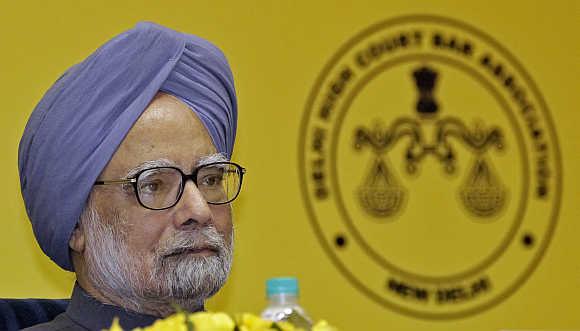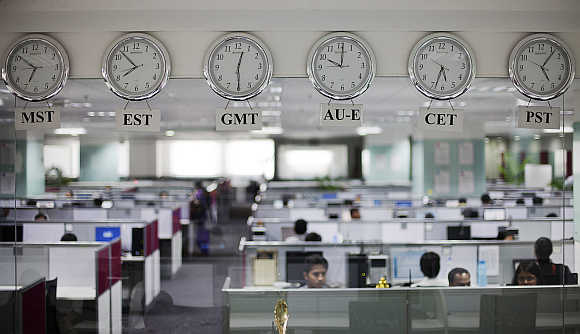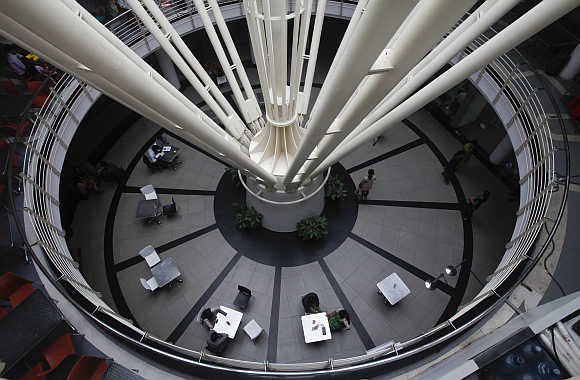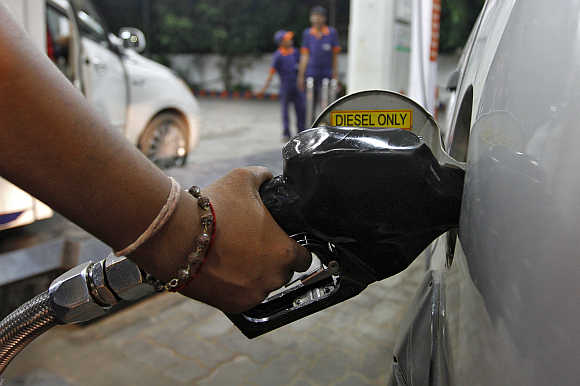Photographs: B Mathur/Reuters Rajeev Malik
Our economic vulnerabilities had been worsening for years on your watch and were flashing red for at least one or two years. But the government was missing in action.
Dear Dr Manmohan Singh,
My belated greetings to you on your 80th birthday. I would consider myself lucky if I can be even half as active as you when - and if - I turn 80. I am writing to you regarding your speech to the nation on September 21.
In that speech you gave the reasons for some of the long overdue decisions by the government. Those measures and some of the subsequent welcome policy actions have been pivotal in reversing the sombre mood.
Indeed, the equity market has understandably benefited from being re-rated, as the government went from sleeping on the job to doing something positive. Still, India must be the only country where a bailout package and revisions in administratively set fuel prices are called "reforms".
India has multiple deficits, but hope is never in short supply. When there is little or no hope, there is always faith. There is nothing like engineering a rally in equity markets to perk up sentiment. But whether the economy will walk, run or fall back will be a function of what more your government will be allowed to do by the political bigwigs in the Congress party.
...
'India should be called Subsidystan'
Image: An outsourcing centre in Bangalore.Photographs: Vivek Prakash/Reuters
I found your speech intriguing in some respects. First, its timing was yet another confirmation that India's politicians and policy makers wait until a crisis-like situation to take some corrective action.
Our economic vulnerabilities had been worsening for years on your watch and were flashing red for at least one or two years. But the government was missing in action. Second, the speech would have been better targeted at your own party, which is hardwired for populism.
Informing the nation that time for tough decisions has come was a bit strange when the causes are mainly related to the government's own policy incoherence and fiscal mismanagement.
Rather than boosting job-enhancing investment, which in turn would also push up economic growth, your fiscal laxity only encouraged consumption at the expense of investment.
The subsidy culture - perhaps India should be called Subsidystan - exists not because the voters demand it but because politicians, such as those in your party and in the Opposition, peddle it for votes.
As a trained economist, are you aware of any tempting item that has ample supply and is available free but has no takers?
Third, your government unfairly took credit for India's high-growth phase between 2004 and 2007, but you blame only the external environment for our current problems.
...
'India should be called Subsidystan'
Image: A view shows workers at a cafeteria at the Infosys campus at the Electronic City area in Bangalore.Photographs: Vivek Prakash/Reuters
The adverse global backdrop is common to all economies - but India stood out for entrenched inflation and almost no fiscal and monetary policy flexibility, thanks to your government's policies.
Surprisingly, you seem unaware that the fallout of slower growth, high inflation, rising interest rates and lack of investor confidence from worsening fiscal deficit that could happen according to you has already been playing out over the last couple of years.
Fourth, the broader middle class justifiably feels alienated as your government continues to cajole the more disadvantaged while all have to suffer corruption and high inflation, shoddy and limited public support services and increasing lawlessness.
Few in India would argue against helping the poor. But your government has gone overboard on that front. In fact, Congress political strategists are in denial if they think that the party will be able to win back the support of the middle class despite forcing it to pay the price of the government's profligacy.
Fifth, the unsustainable jump in your government's social spending remains problematic. India's fiscal dynamics have far less counter-cyclical flexibility than most other countries. This is a direct outcome of the fashion in recent years of new entitlements for the less privileged.
...
'India should be called Subsidystan'
Image: A worker fills a car with diesel in Ahmedabad.Photographs: Amit Dave/Reuters
More such initiatives are likely in the run-up to the next general election because of the Congress party's fixation with populism, euphemistically labelled by it as inclusive growth.
The subsidy bill should be cut significantly. But the government wants the middle class to bear that financial pain so that it can continue with its spending on vote-enticing initiatives, such as the food security Bill, which add to fiscal insecurity.
Even if the government manages to desperately stretch the intake from divestment to shrink the current fiscal shortfall, the next Budget in February 2013 is probably going to be a populist one. The quality and quantity of fiscal adjustment remain poor. You are merely kicking the can down the road.
Central banks in some advanced economies have had to target their financial markets. In India, it is the government that is high on pumping up the equity market without undertaking the necessary qualitative fiscal correction.
The idea appears to be to reflate the equity market to ensure the success of the divestment programme, help companies, appreciate the rupee and spread the feel-good factor. Of course, investors will enjoy the ride for now. But if pushing up equity prices could solve all economic imbalances, central banks would be manned by equity brokers.
...
'India should be called Subsidystan'
Image: Workers suspended on ropes clean the glass facade of a commercial complex in Chennai,Photographs: Babu Babu/Reuters
It is possible that the recent policy announcements will be followed by a few more constructive moves, including measures to attract more portfolio inflows. And then we get stuffed with more populist measures.
The reverse order would surely not have worked. But the underlying approach seems clear - attract foreign capital, but ensure that the pet populist initiatives do not suffer.
The Reserve Bank of India will probably have little choice but to play along. But it is worth assessing the merits of rupee appreciation, given our current macro problems and whether it can appreciate on a sustained basis, despite the headwind of India's high inflation differential.
In your speech you reminded the voters that "money does not grow on trees". It is a welcome realisation since India's fiscal blowout, inflation surge and the collapse in growth occurred on your watch. To be fair, the reminder would have been better targeted at the Congress party's leadership, whose penchant for populist spending initiatives is a key reason for continued fiscal stress.
Sir, India's middle class voters live in the real world in which they are frequently reminded by their daily hardships that money does not grow on trees. However, if the ballooning - but still understated - market borrowing of the government is a yardstick, money does seem to grow on trees for your government.
(The writer is senior economist at CLSA, Singapore. These views are his own)







article